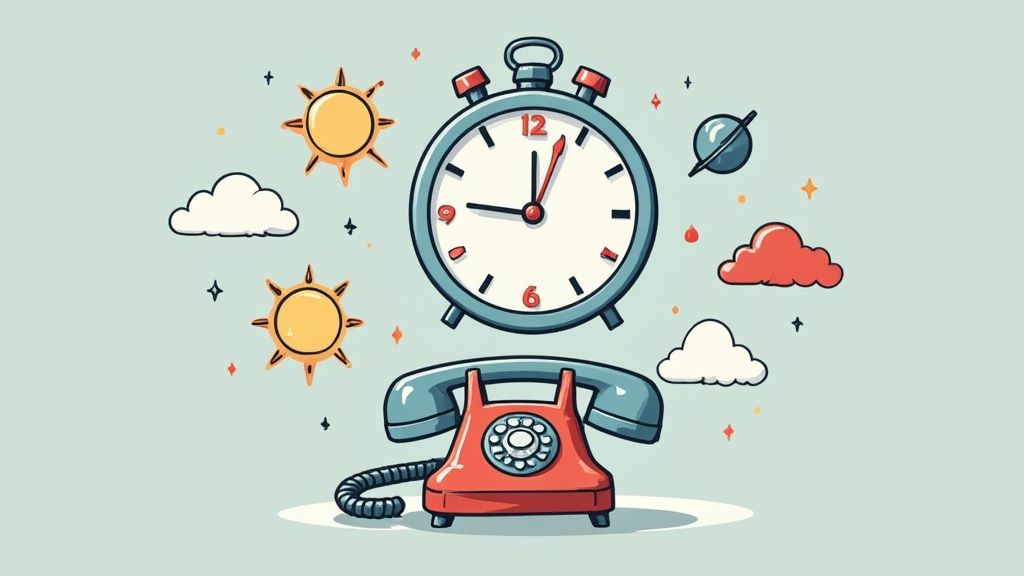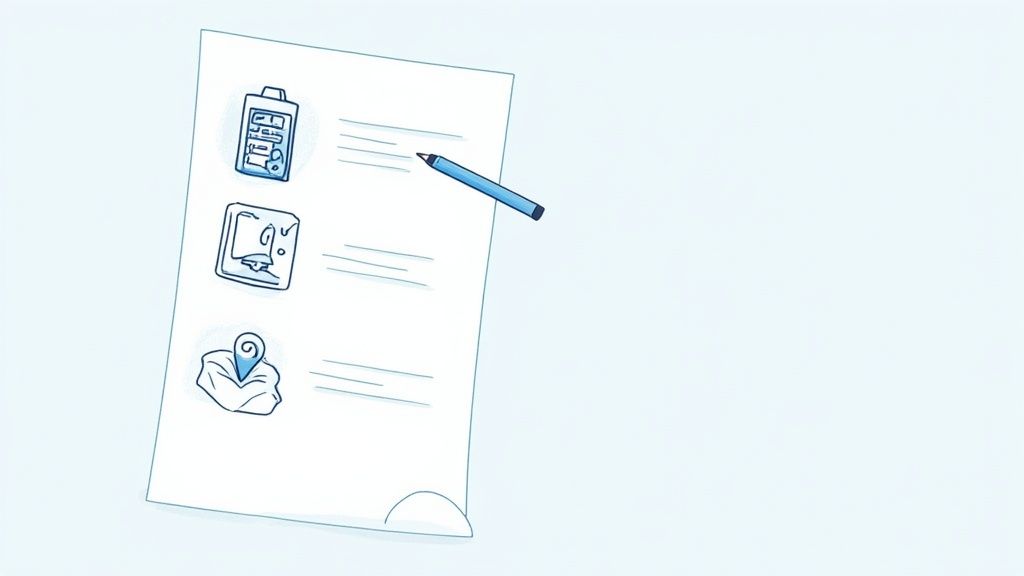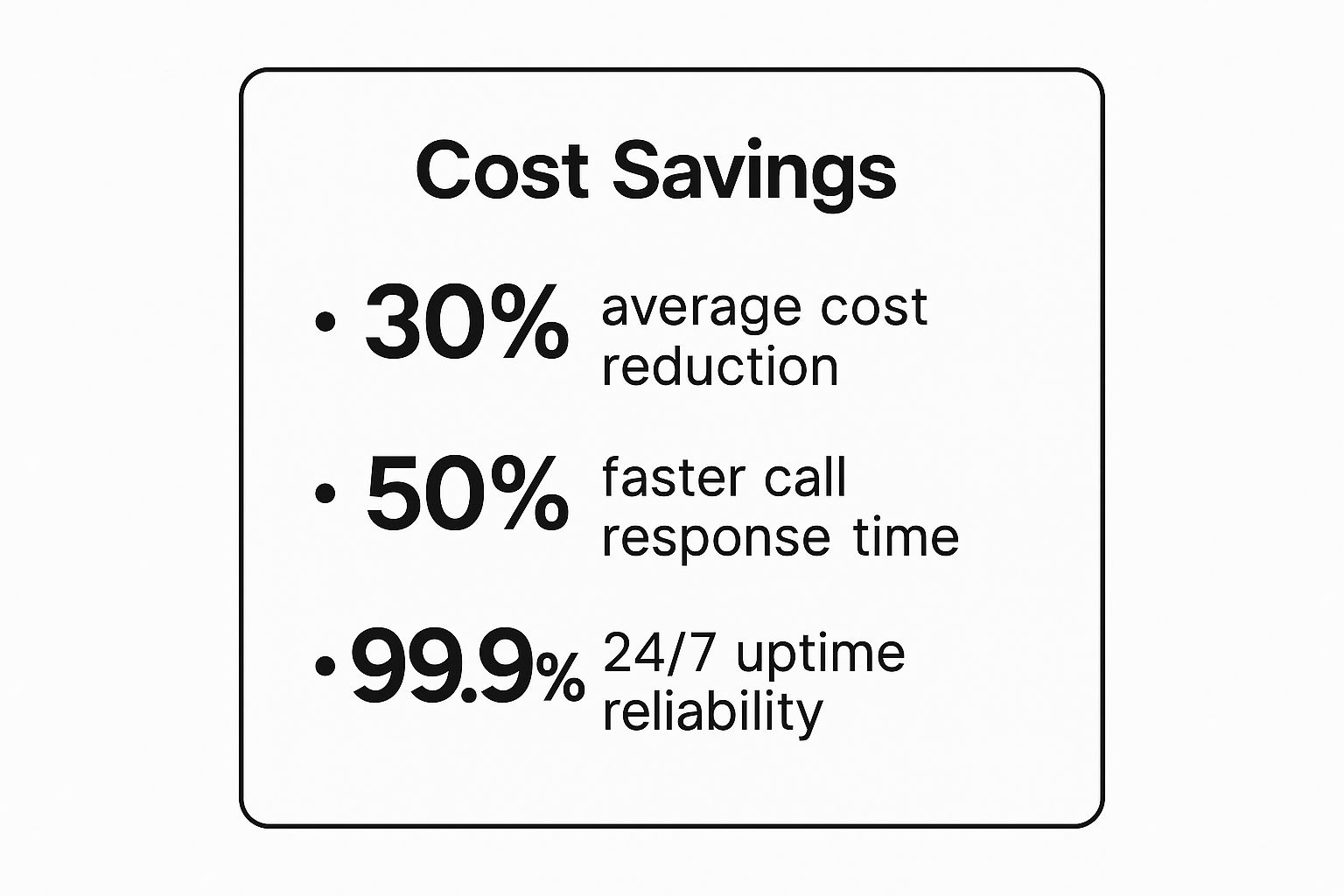Think of an emergency call answering service as the communications backbone for your business, ready to spring into action 24/7. It's a dedicated team of live agents who step in to professionally handle critical calls, even at 3 AM on a holiday, ensuring you never miss an urgent opportunity.
It’s not just about answering the phone; it’s about acting as a seamless extension of your own team when you simply can't be there.
What Exactly Is an Emergency Answering Service?

Picture your business as a fortress. During the day, you're on the wall, managing everything. But what happens after you lock the gates for the night? An emergency answering service is your ever-vigilant night watch, guaranteeing no alarm goes unheard.
For a plumber, this might be a frantic call about a burst pipe flooding a basement. For an HVAC company, it could be a furnace that dies in the dead of winter. These aren't issues that can sit in a voicemail inbox until Monday morning. They require a real, human response—and fast.
More Than Just a Message Pad
It's easy to think these services just jot down messages. But a quality service is so much more; it's a vital component of your operations, trained to do far more than just say hello.
A professional answering service is built to be a problem-solver from the second they pick up the phone. Below is a quick look at their core responsibilities.
Core Functions of an Emergency Answering Service
| Function | Description |
|---|---|
| Information Capture | Agents follow a custom script to gather every critical detail. |
| Urgency Triage | They expertly distinguish between a true emergency and a routine query. |
| Protocol Execution | They know exactly who on your on-call team to contact and how. |
| Dispatching | They dispatch your technicians according to your precise instructions. |
Essentially, the service doesn't just tell you there's a problem. It identifies the exact nature of the problem and gets your team moving to solve it.
This system is about safeguarding your business from every angle. It stops you from losing out on high-value emergency jobs that come in after hours. More importantly, it protects your hard-earned reputation.
When a panicked customer is met with a calm, professional voice that offers immediate help, it turns a potential disaster into a moment of exceptional service. That kind of experience builds unshakable trust and loyalty.
Ultimately, an answering service closes the gap between your 9-to-5 schedule and your customers' 24/7 reality. To get a better feel for how this could transform your business, you can explore our complete guide on the benefits of an emergency answering service.
Why After-Hours Emergency Support Is a Game-Changer

For any service business, a call that rings out after hours isn't just a missed job. It's a small crack in the foundation of customer trust. Emergencies don’t care about business hours, and when a crisis hits—a burst pipe, a dead furnace in winter—customers aren't looking for voicemail. They need a human being who can help, now.
Letting those late-night calls go to an automated greeting is the digital equivalent of hanging a "Closed" sign on your front door. Meanwhile, your competitor who picks up the phone just landed a new customer. It's that simple. When you provide a real solution during a customer's moment of panic, you don't just solve their problem. You build a kind of loyalty that pays for itself for years to come.
The Real Value of Being Ready 24/7
The power of an emergency call answering service runs much deeper than just catching every lead. It’s really about getting smarter with your operations, protecting your reputation, and looking after your team.
Think of it as an intelligent filter.
A trained, professional agent can tell the difference between a genuine emergency and a routine question in seconds. This means your on-call tech only gets dispatched for the urgent, high-value jobs, not a simple query about your business hours.
This filtering pays off in two huge ways:
- It protects your team from burnout. Your technicians are your most valuable asset. When they know they’ll only get woken up for a true crisis, they stay fresh, motivated, and ready to deliver their best work.
- It boosts your profitability. You can focus your after-hours resources on the jobs that actually make you money. Suddenly, your 24/7 availability becomes a powerful revenue stream instead of a logistical nightmare.
Here's a real-world example: A regional HVAC company made one change. They ditched their after-hours voicemail for a live answering service. The outcome? They doubled their emergency repair income and saw a 40% jump in customer retention inside of a year. All because a calm professional answered every single late-night call.
Building Trust When It Matters Most
Picture this: a customer's basement is flooding, or their heat cuts out during a blizzard. Their stress is through the roof. When their call is met by a calm, professional agent who can dispatch help immediately, that’s an incredibly reassuring experience.
That single interaction sets the tone for the entire relationship. A voicemail says, "We'll get back to you when we can." A live answer says, "We're here for you right now." In today's competitive market, that difference is everything. For businesses wanting to master this critical touchpoint, digging into how an after-hour answering service works can be a real eye-opener.
This immediate readiness shows a level of professionalism that customers don't forget. It proves your business is reliable not just from 9-to-5, but whenever they truly need you. That’s the real return on investment—it cements your reputation as the expert who's always on duty.
What a Top-Notch Answering Service Really Looks Like

When a customer is facing a real emergency, "good enough" is a recipe for disaster. It's tempting to pick an answering service based on price alone, but that’s a dangerous gamble. What you should be hunting for is operational excellence, which is built on a handful of non-negotiable features.
These aren't just bells and whistles. They're what transform a basic message-taker into an intelligent, reliable extension of your team. It's the difference between a smoke alarm that just shrieks and a monitored security system that gets the fire department on the way, instantly.
Custom Call Scripting and Protocols
This is the big one: custom call scripts. It’s the feature that lets an agent sound like they’ve been part of your company for years. Instead of a generic, one-size-fits-all greeting, the agent follows a conversation flow that you designed. They ask the exact questions one of your own people would.
This script is your tool to guide them. It ensures they capture the vital details—distinguishing between "water is leaking through my ceiling" and "my toilet won't stop running." One is a crisis, the other is an annoyance.
Right alongside this, you need intelligent dispatch protocols. This is where you set the rules of engagement. A call about a suspected gas leak? That needs to trigger an immediate phone call to your on-call lead, no matter the time. A non-urgent question about routine maintenance? That can wait in an email for the morning crew. This is how you make sure your team is only scrambled for true emergencies.
Secure and Multi-Channel Messaging
Okay, the agent has the message. Now, how does it get to you? The answer has to be more sophisticated than just a simple email. A top-tier service offers secure, multi-channel message delivery, which means you aren't stuck with a single point of failure.
You need the flexibility to get alerts through multiple avenues:
- SMS Text Messages: For instant notifications that pop up right on your phone.
- Email: For detailed summaries that create a clear paper trail for every job.
- Mobile App Notifications: For a central hub where you can manage everything and quickly pull up call logs.
This multi-channel approach builds in redundancy. It guarantees a critical alert won’t be missed just because you're in a spot with bad cell service or haven't checked your inbox.
The backbone of any emergency call answering service is its call center's performance. Quality providers follow strict benchmarks, with industry targets aiming for 80% of calls to be answered within 20 seconds. Speed and satisfaction are key metrics, reflecting the system's ability to handle urgent situations effectively. Find out more about call center performance standards from Sprinklr.
Call Recording and Compliance
For both quality control and your own protection, call recording is absolutely essential. Having a secure, unedited recording of every single interaction protects you and your customers. It lets you review exactly how agents handle calls, verify the details of a job, and put any "he said, she said" arguments to rest with a factual record.
Finally, if your business touches healthcare or related fields, HIPAA compliance isn't just a feature—it's a legal necessity. A HIPAA-compliant service has proven they have the administrative, physical, and technical safeguards to protect sensitive patient information. This protects you from massive fines and, more importantly, protects the trust your patients have in you. Focusing on these core features ensures you find a partner that delivers when the stakes are highest.
What Does an Answering Service Cost, Anyway?
Let’s talk numbers. Bringing an emergency call answering service on board is almost always a smarter financial move than hiring dedicated overnight staff. The real trick is getting your head around the common pricing structures so you can budget effectively and sidestep any surprise bills down the road.
Once you demystify the models, you can pick a plan that fits your call volume and business needs like a glove.
Most providers build their pricing around a few core models. Each one has its own set of pros and cons, depending entirely on how many emergency calls your business fields on a typical night or weekend.
Just look at the direct value a service can bring. We’re talking about serious cost reductions, much faster response times, and rock-solid reliability.

These figures aren't just fluff; they show that the right service is more than just an expense. It’s an investment that actively improves your operations and delivers a real return.
Common Pricing Models Explained
Choosing the best plan begins with knowing what’s out there. You'll generally run into three main structures: pay-per-call, pay-per-minute, and bundled monthly plans.
-
Pay-Per-Call: Simple and straightforward. You’re charged a flat rate for every single call the service answers for you. This is perfect for businesses with low or unpredictable call volumes—think of a specialty contractor who only gets a handful of true emergency calls each month.
-
Pay-Per-Minute: This is probably the most popular option, and for good reason. You only pay for the exact time agents are on the phone with your customers. It's incredibly efficient because you're not paying for the dead air between calls. Every dollar you spend goes directly toward productive work.
-
Bundled Monthly Plans: With this model, you pay a fixed fee each month for a set block of calls or minutes. It's a fantastic fit for businesses with a high and steady call volume, like a busy towing company. You get a predictable bill and usually a lower per-minute rate.
Knowing these options helps you match your spending to what you actually need. A pay-per-minute plan, for example, keeps you from overpaying during your slow season. On the flip side, a bundled plan acts as a financial shock absorber, protecting you from a massive bill during an unexpectedly busy month.
Making the Smartest Financial Choice
So, which one is right for you? The best pricing model is the one that lines up with your company’s unique call patterns.
Take a look at your call logs from the last few months. Do you get a pretty consistent trickle of after-hours calls every night? Or do they tend to show up in sudden, unpredictable bursts?
If your call volume is steady, a bundled plan probably offers the best bang for your buck. But if it’s more sporadic, a pay-per-minute or pay-per-call structure gives you the flexibility to pay for what you use without getting locked into a hefty monthly commitment.
For a more detailed breakdown of how these costs stack up against other phone solutions, our guide on virtual receptionist pricing is packed with useful insights. Making an informed choice is what turns your emergency answering service from just another expense into a profitable asset.
How Technology Changes the Game
If you're picturing an emergency answering service as just a person with a headset and a script, it's time to update that mental image. Modern response systems are built on a powerful layer of technology that boosts efficiency, gives you critical insights, and ensures things are rock-solid when it matters most. This tech stack is what turns a basic service into a smart communications hub.
At the heart of this shift are things like artificial intelligence (AI) and machine learning (ML). You can think of AI as an intelligent gatekeeper that instantly triages incoming calls. It can analyze the tone of a caller's voice and the words they use to figure out how urgent the situation is, separating a true crisis from a routine question before a human agent even gets involved. This ensures your most critical calls get pushed to the front of the line, every single time.
The Power of the Cloud
The engine making all of this run smoothly is the cloud. Forget those clunky, old on-premise phone systems. Cloud-based platforms offer huge advantages that are perfectly suited for the unpredictable world of emergency response.
- It just works, even in a crisis. A cloud system can handle a sudden flood of calls—like during a major storm or power outage—without crashing or leaving frantic customers on hold.
- It's incredibly reliable. The best providers host their systems in super-secure data centers with backups for their backups, guaranteeing near-perfect uptime.
- It’s accessible everywhere. You can securely check call logs, listen to recordings, and look at performance reports from anywhere with an internet connection. This gives you a real-time pulse on your operations.
This technological foundation is what’s fueling massive growth, especially in critical fields. The medical answering services market, for instance, was valued at $2.5 billion in 2023 and is expected to nearly double by 2032. That explosive growth is driven by the need for healthcare providers to manage patient communications 24/7—a demand that AI and ML are perfectly positioned to meet. You can get more insights into this rapidly expanding market over at Dataintelo.com.
An emergency call answering service that’s backed by modern tech doesn't just take messages—it creates actionable intelligence. It transforms your call history from a simple logbook into a strategic asset.
From Answering Calls to Analyzing Data
This is where the real magic happens. The data gathered from every single call becomes a goldmine of information. By looking at trends, you can spot patterns you’d otherwise miss, like when your emergency calls tend to spike or which types of problems pop up most frequently.
Armed with that knowledge, you can start making smarter decisions. You can adjust your on-call schedules to make sure you have the right people ready during your busiest hours. It turns your answering service from a purely reactive tool into a proactive one, helping you fine-tune your entire emergency response strategy for better outcomes and a more efficient business.
Choosing the Right Answering Service Partner
Picking an emergency call answering service isn’t like choosing a new software subscription. It's much more like bringing on a business partner. When a crisis hits, this service becomes the voice of your company, and that makes the decision to hire one incredibly important. Get it right, and you protect your brand. Get it wrong, and… well, you get the idea.
You need a partner who gets what's at stake. This goes way beyond a simple price sheet comparison.
Look for Real-World, Industry-Specific Experience
A one-size-fits-all script just won't cut it when things get serious. Your partner has to understand the unique language and pressures of your world. Can their agents tell the difference between a routine plumbing leak and a burst pipe that's actively flooding a basement? Do they know the right questions to ask to figure out if an electrical issue is a nuisance or a genuine fire hazard?
Don't be shy about asking for proof. Ask potential providers for case studies or to speak with other businesses like yours they currently work with. This is the only way to know they have hands-on experience with the exact kind of emergencies your customers will be calling about.
Your answering service is your first line of defense. Their ability to stay calm, professional, and sharp under pressure is a direct reflection of your business. The right partnership can turn a potential disaster into a moment that proves just how reliable you are.
This kind of specialized knowledge also matters if you operate beyond your local area. Here in the United States, 911 has been the standard emergency number since 1968, but that's not the case everywhere. Much of Europe uses 112, and other countries have their own systems. For any business with an international footprint, this highlights the need for a partner with the right infrastructure and regional knowledge. You can see just how much emergency numbers differ around the world on WorldPopulationReview.com.
Put Their Service to the Test
You wouldn't hire a key employee without an interview, right? The same logic applies here. Before you even think about signing a contract, you need to put them through their paces.
Here are a few practical ways to do a thorough evaluation:
- Be a "Secret Shopper." Call their service line yourself. Pretend you’re a customer with an urgent problem and see how they handle it. Pay close attention to their tone, how efficient they are, and whether they sound genuinely professional.
- Ask About Agent Training. How do they get their people ready for your calls? Dig into their onboarding process and ask what kind of ongoing training they provide to keep agents sharp.
- Demand Their Disaster Recovery Plan. What’s their backup plan? If a storm knocks out their power or their own systems fail, you need to know they can keep answering your calls without a hiccup. A serious provider will have a solid plan.
- Read the Fine Print. Get a copy of the contract and go through it with a fine-tooth comb. Look for hidden fees, inflexible terms, or long-term commitments that might lock you into a bad fit.
Making an informed choice here is about more than just capturing leads. It’s about building a partnership that solidifies your reputation for being dependable, no matter the time of day or night.
Still Have Questions? Let's Clear a Few Things Up
It's one thing to see the benefits on paper, but I get it—you probably have some practical questions about how this all works in the real world. Let's tackle some of the most common ones I hear from business owners just like you.
How Do Agents Know Who to Dispatch for My Company?
This is where you come in. Top-tier services don't just wing it; they follow a playbook that you help write from day one. During the setup process, you’ll work with them to build out your custom dispatch protocols.
Think of these protocols as your company's "if this, then that" instructions. You'll define everything from who's on call and when, to the exact contact methods for each technician—whether that’s a direct call, a text message, or an alert through a mobile app. The agents are trained to follow your guide to the letter, so the right person gets the right call, every single time. No guesswork involved.
Can an Answering Service Handle Complex or Technical Calls?
Absolutely. While the agents aren't licensed plumbers or electricians themselves, they are experts in information gathering. They're trained on your industry and armed with custom scripts you help create.
They’ll ask smart, qualifying questions to figure out the severity and nature of the issue. This means your on-call tech doesn't get a cryptic "the water heater is broken" message. Instead, they receive a detailed report with the critical information they need to show up prepared and solve the problem efficiently.
This systematic approach is a game-changer. Think about how municipal services handle city-wide emergencies—they have clear communication plans so citizens know exactly who to call, which prevents the whole system from getting overwhelmed. A professional answering service brings that same level of orderly, guided response to your business.
What Happens If My On-Call Person Does Not Answer?
Any service worth its salt has a rock-solid backup plan for this exact scenario. It's called an escalation procedure, and it's built directly into your protocol.
If your primary on-call contact doesn't pick up after a set number of attempts, the agents don't just give up. They automatically move to the next person on your list. They’ll keep working their way down your predetermined chain of command until someone from your team acknowledges the call. This layered approach is your safety net, ensuring a true emergency never, ever falls through the cracks.
Ready to stop missing urgent calls and start capturing every dollar of opportunity, 24/7? See how Marlie Ai can become your always-on, expert receptionist for just $0.25 a minute. Learn more at Marlie.ai.

